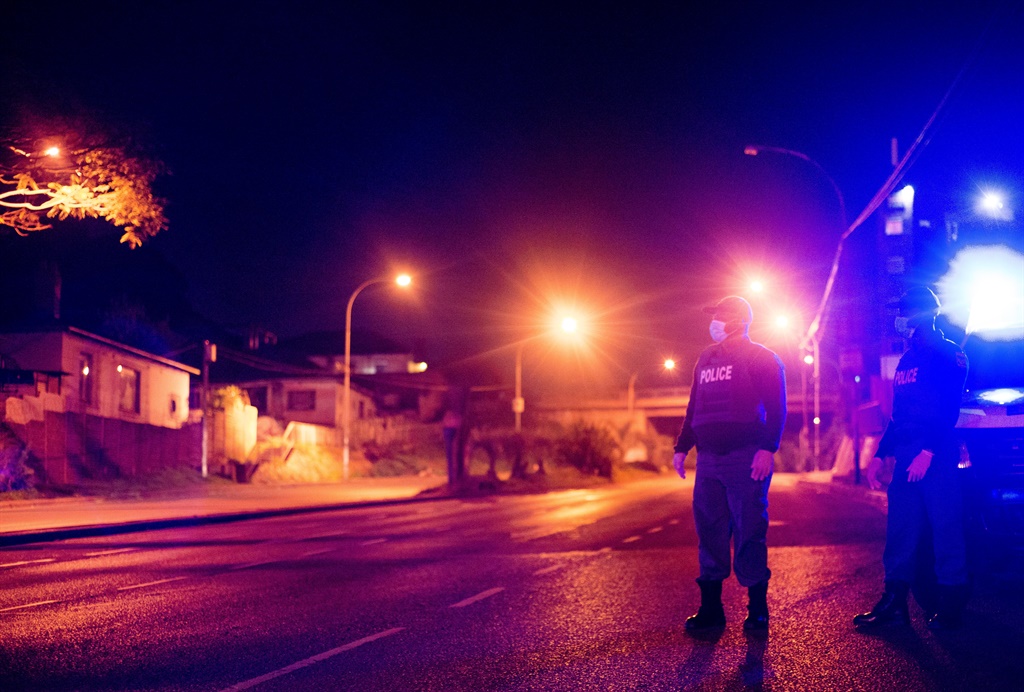


Members of the South African Police Service. (ER Lombard/Gallo Images)
- President Cyril Ramaphosa reimposed a national curfew after it was lifted nearly a month ago.
- Constitutional law experts have argued that the curfew can be challenged in courts.
- A curfew infringes on an individual’s constitutional right to movement and dignity.
Nearly a month after President Cyril Ramaphosa lifted the national lockdown curfew, it was reintroduced in the middle of June when Covid-19 infections in the country spiked.
Ramaphosa said a curfew would help to reduce pressure on hospitals amid the pandemic.
Constitutional law professor Pierre de Vos has since questioned whether the 21:00 to 04:00 curfew is constitutionally valid, and can therefore legally be challenged.
In his popular blog Constitutionally Speaking, De Vos explained that the curfew infringes on South Africans’ right to freedom of movement as defined in Section 21 of the Constitution.
“Clearly, a curfew radically curtails an individual’s freedom of movement and would only be justified in extreme cases,” he said.
Both University of Western Cape public law and jurisprudence senior lecturer Dr Sarah Fick, and University of Johannesburg legal expert Elton Hart, agree the national curfew can be legally challenged.
READ | The SIU has been let loose on Covid-19 corruption
News24 looked at the reasons why the national curfew can be legally challenged, and what has to be proved for it to be declared invalid.
Can the national curfew be legally challenged?
Fick said the national curfew can be challenged on the ground that it is irrational and also, as mentioned by De Vos, on the ground that it infringes on one or more rights in the Bill of Rights.
She said the curfew may also infringe on other rights, such as the right to human dignity, as defined in Section 10 of the Constitution, and the right to life defined in Section 11 of the Constitution.
“This is seen in the current hospitality industry protest. The curfew is limiting their ability to function and causing loss of jobs, which one can argue limits the right to dignity and even life,” Fick told News24.
Hart said since a constitutional right is being infringed upon, it is absolutely essential to ensure the infringement is justifiable or not, which can be done by legally challenging it.
What needs to be proved for the curfew to be declared invalid?
Hart told News24 that a legal challenge will have to show the curfew is not necessary to achieve desired results, or is unnecessarily infringing on constitutional rights.
“If the curfew is not the only way to achieve the desired result, this limitation of people’s right to movement is not in line with the Constitution, and it will not be justifiable,” Hart said.
READ | Ramaphosa vows ‘very severe’ consequences for theft of Covid-19 relief funds
“Government also needs to show that they have exhausted all other methods at our disposal and this is the last method to curb the spread of the virus. So they will weigh public interest against the individual’s right to freedom of movement.”
Fick said the state would have to show that the limitation of the rights is reasonable and justifiable in terms of the Constitution.
“This includes a consideration of whether there are less restrictive means of achieving the purpose of the curfew.”
De Vos said the purpose of stopping people from socialising at night, which helps in fighting the spread of the virus, is an “important and pressing” one. However, if the curfew exists to make it easier for police to enforce lockdown regulations, it is not a critical reason.
What are the chances that it can be overruled?
Hart said the chances that the court will reverse the national curfew is “highly likely”.
“One first needs to look if between the hours of 21:00 and 04:00 how many people actually got infected and I don’t think the government has clear data to show when the infections actually occur,” Hart said.
“Most of the infections happen during the daytime, then why would you impose a curfew at night when you know at night naturally the number of people that’s on the street is much less than what’s happening in the day?
READ | Lockdown: Higher education academic year may only end in March 2021
“So this indicates that the decision is not rational and not supported by data.”
Fick said the courts have recently ruled in favour of the state, and are hesitant to rule that the state’s measures are unlawful or unconstitutional.
She said the arguments by the hospitality industry over their right to earn a living, which employs roughly one million people, is quite strong.
“I have read that the curfew is especially limiting on their operations since their dinner service has to end at around 19:00 to give them time to clean up and get home before the curfew,” Fick said.

